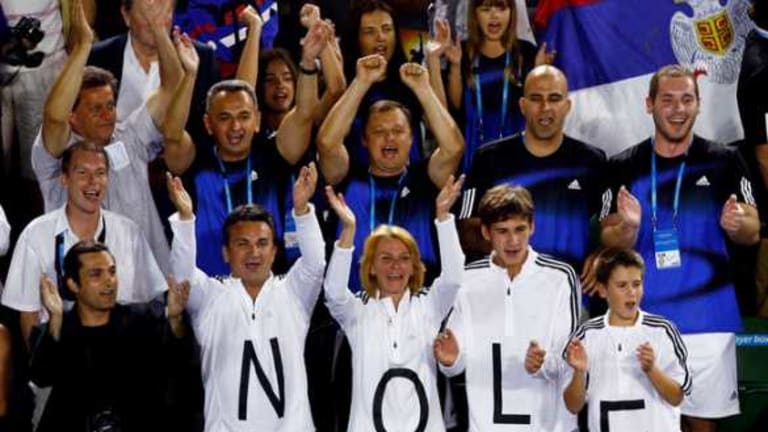In 2008, Novak Djokovic lifted his first Australian Open trophy, sinking to the court in disbelief after overcoming Jo-Wilfried Tsonga in four sets. Watching on as he collected the gleaming Norman Brookes Challenge Cup was his 12-year-old brother Djordje. As he screamed his adulation from the sidelines, the youngster dared to dream that one day, he too would have a chance to play on tennis’ grandest arenas.
He was not dreaming alone. In his victory press conference, Novak proudly told the assembled media that in the near future they would soon be reporting on the prowess of another Djokovic, declaring that Djordje was the most talented in the family.
But as Novak’s star continued to rise, Djordje’s path through the massed ranks of gnarled old journeymen and fresh-faced hot shots that make up the lower rungs of the professional tennis ladder was becoming ever more laden with difficulty.
These days, beating a Djokovic—any Djokovic—is a scalp worth having. And as Djordje has found so far, even the tour’s has-beens compete with a renewed vigor when they see him in the draw.
"The other players see my name, but it makes them even more determined,” he said, after a testing first year on the futures circuit which saw him record just two singles victories. “I’m trying to deal with this as best as I can but it makes my job even tougher. On court it feels like they have far more will to win compared to when I watch them play other players."
Djordje took the time to discuss his experiences so far with TENNIS.com.
Q: Has the pro tour been harder than you expected it to be?
Djordje Djokovic: Yeah! I’ve been following my brother in these tournaments throughout his career and I think that right now, these futures tournaments have never been harder. There’s guys ranked around 180 and 190 playing futures. I couldn’t believe what I was seeing sometimes. I was like, ‘What are you guys doing here! Go and play challengers. Give us a break, let us win some points. It’s tough to play against these guys.
Q: You turned 18 last summer and played junior Davis Cup as well as some futures. What is the biggest difference between the juniors and the professional tour?
DD: When you start playing futures, it’s so different. The guys in these tournaments don’t miss that much and on the other side of the court you have someone who’s maybe 10-15 years older than you and he’s been playing these [events] for many, many years.
It feels like you’re such a baby on court when you play against those players. You feel like they’re so much older than you. You find yourself respecting them and then you remember, ‘Oh wait, I’m here to beat him!’ I’ve been in too many of these situations. Honestly, I think it’s a big difference because in junior tennis, you don’t have the same pressure. In juniors everyone’s much more relaxed and they’re just playing to get matches and experience. On the ATP tour, if you win a point your ranking is getting better and you’re getting closer to the top, to the highest level. I think all the players feel this pressure when playing futures and challengers.
Q: You received plenty of wildcards during 2013. While it must be tempting to keep taking those opportunities, do you feel you might turn down a few wildcards in order to play qualifying and get more wins under your belt?
DD: Yeah, so in 2013 I took 12 wildcards. I had a few experiences of playing challenger main draws as well as the futures. Game-wise I think I can handle the guys in the Top 300 but I’m lacking experience and confidence. I’m making good contacts with the tournament directors and trying to continue making connections so that they keep giving me some opportunities. They’re watching me in a lot of my practice sessions and seeing me practice with Novak and with other players. I think I’m playing well for now but everyone expects a lot of me because of Novak which is hard as I’m trying to make my own name. I hope I can start to do that in the next few years.
Q: Novak’s comments in Australia a few years ago have given everyone high expectations of you!
DD: Yeah that made my problem even bigger, you know! But of course, he’s my brother and he always helps me a lot with his advice on everything. He’s been through these tournaments and he knows how to handle the different situations better than anyone, but you know, talent is like two percent of what it takes to make it on the tour!
